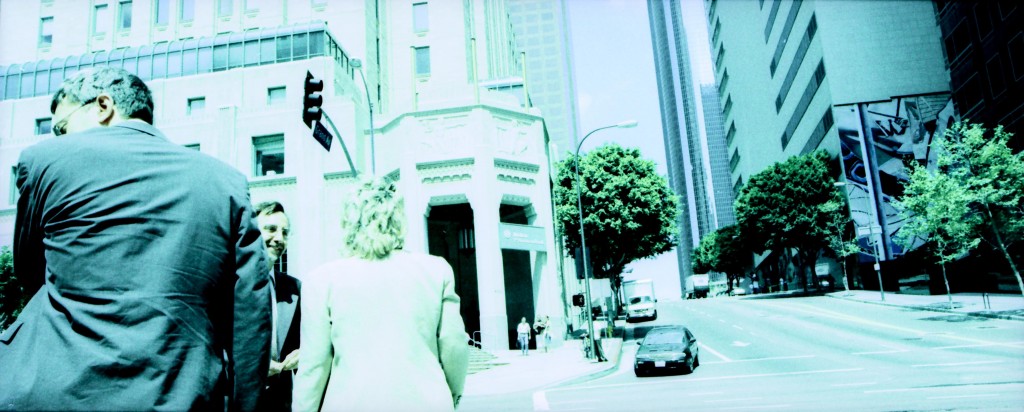
Not all of the conversations I have on the bus are the gleeful bastardizations of syntax which I often record– and which are no less legitimate uses of the English language, mind you.* Here’s a sample of a perfectly grammatically acceptable discourse.
“So what’s playing at the Benaroya tonight?” I ask as we approach Union. He, a slightly older man in a crisp black three-piece, had asked earlier for Seattle Symphony.
“Rachmaninoff.”
“Oh, excellent!”
“Two symphonies, I don’t know them too well. Hey, you’re the friendliest bus driver I think I’ve ever seen.”
“Oh, thanks!”
“I especially appreciate the announcement of the upcoming stop after the next stop.” Referring to how I try to keep folks informed when we’re in the CBD in skip-stop heaven, as in, “the stop after this one is James.”
“Oh, thanks! It’s great to get the feedback. Rachmaninoff, excellent! I’m not as familiar with his work as with other composers.”
“Did you ever see that movie Somewhere in Time, with Christopher Reeve, from the eighties?”
“Not for ages, but yes!”
“Well, the main theme for that is from a Rachmaninoff symphony.”
“Oh, terrific!”
“But yeah, I dont know these symphonies too well. These were free tickets!”
“Well, there you go! Not a bad way to pass the time!”
“Exactly!” Chuckling.
“Yeah, the last time I was here was for the Ninth symphony, Beethoven. Obviously fantastic,” I say, throwing my hand in the air, as if giving up at the act of trying to succinctly express how great it was. I was raised on Classical music. To me, it’s strange to consider it as a genre, as we consider folk or hip-hop; it’s so much infinitely larger. Classical’s been around for a thousand years. Popular music’s existed for a mere sixty or so. The vast, overwhelming percentage of existing music is Classical music, and some of it is absolutely worth your time. As Grand Puba says in the Tupac Shakur tune, “I wouldn’t be here today, if the old school hadn’t paved the way.”
“Oh, it’s such a great place.” I forget which of us said this. “It is,” the other said. We were both basking in the shared warmth of loving the same thing.
“I have season tickets!” he said.
“Perfect! Well, hope it’s a great evening!”
“Thanks! You enjoy the rest of your shift.”
The color of his tone was sincere, and the last sentence carried with it the implication that my time tonight on the road was as valuable as his inside the Symphony hall, if not moreso. What I loved about the exchange was the undercurrent drifting through all of it, which I felt all the more strongly because it remained unspoken: he, the man wearing a suit probably worth my entire paycheck, spoke to me with not a trace of condescension. A good day’s work and the ability to appreciate culture existed for him on a spectrum which included not just people like him in the narrow sense, but myself and everyone else.
A girlfriend once asked me why I like the LSBW (read the post about her or watch my speech on this legendary passenger if you haven’t already). I remember looking out the window and thinking a moment before saying, “because I have so much more in common with her than I don’t have in common.”
“Really?” she said, listening.
I thought so. Just a few changes in brain chemistry and life circumstances were all that separated us. Mr. Rachmaninoff, above– hopefully he doesn’t mind my calling him that– seemed to have a similar view, and it felt good to be on the receiving end of that.
*”The myth that non-standard dialects of English are grammatically deficient is widespread,” writes linguist Steven Pinker. We can all grasp that language evolves through slang and progresses to new places through colloquial use, but additionally, dialects such as the much-maligned Black English Vernacular (BEV) have just as constructed a framework as the more familiar Standard American English (or SAE, itself a derivation of British English). From Chapter 2 of Pinker’s The Language Instinct: “Where SAE uses there as a meaningless dummy subject for the copula, BEV uses it (compare SAE’s There’s really a God with BEV’s It’s really a God). Larry’s negative concord (You ain’t goin’ to no heaven) is seen in many languages, such as French (ne…pas). BEV allows its speakers the option of deleting copulas (If you bad); this is not laziness but a systematic rule that is virtually identical to the contraction rule in SAE that reduces He is to He’s, You are to You’re…. In both dialects, be can erode only in certain kinds of sentences.” BEV does not allow Yes he is! to contract to Yes he!, as SAE doesn’t allow Who is it? to contract to Who it? Pinker continues, stressing that BEV isn’t all about contraction: “BEV speakers use the full forms of certain auxiliaries (I have seen), whereas SAE speakers usually contract them (I’ve seen). He be working means that he generally works, perhaps that he has a regular job; He working means only that he is working at the moment that the sentence is uttered. In SAE, He is working fails to make that distinction.”
Nathan Vass is an artist, filmmaker, photographer, and author by day, and a Metro bus driver by night, where his community-building work has been showcased on TED, NPR, The Seattle Times, KING 5 and landed him a spot on Seattle Magazine’s 2018 list of the 35 Most Influential People in Seattle. He has shown in over forty photography shows is also the director of nine films, six of which have shown at festivals, and one of which premiered at Henry Art Gallery. His book, The Lines That Make Us, is a Seattle bestseller and 2019 WA State Book Awards finalist.



